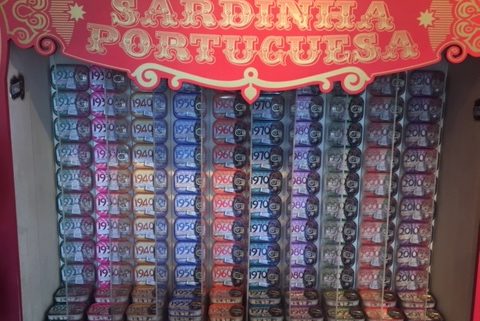Canned
‘They sat down, lit their cigars, were about to discuss a business deal involving cork or canned fish, we would know for certain except that Ricardo Reis is now leaving’
(José Saramago, 1992. The Year of the Death of Ricardo Reis)
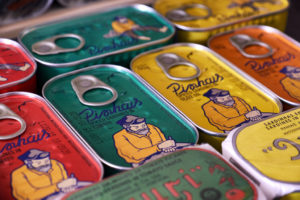 Prepared in azeite (olive oil) or tomato sauce, canned fish – the country’s original fast food – is not only cheap but also rich in omega-3, protein and calcium. Sardines account for nearly one-third of canned fish, the remainder includes mackerel, tuna, codfish, eel, octopus and mussels.
Prepared in azeite (olive oil) or tomato sauce, canned fish – the country’s original fast food – is not only cheap but also rich in omega-3, protein and calcium. Sardines account for nearly one-third of canned fish, the remainder includes mackerel, tuna, codfish, eel, octopus and mussels.
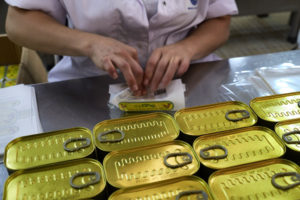 Tinned fish has been part of Portugal’s culinary heritage since 1853 when the national canning industry was born. The traditional production process of selecting, cleaning and cooking the fish to individually canning and wrapping the tins – in 90% still done by hand – hasn’t changed much over time. Sardines are processed and canned the day they are caught and age in the can for maximum flavour.
Tinned fish has been part of Portugal’s culinary heritage since 1853 when the national canning industry was born. The traditional production process of selecting, cleaning and cooking the fish to individually canning and wrapping the tins – in 90% still done by hand – hasn’t changed much over time. Sardines are processed and canned the day they are caught and age in the can for maximum flavour.
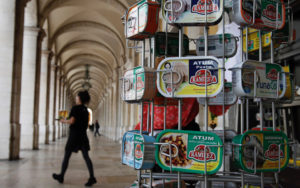
Locals eat it with everything, from bread to salad. For many years tinned fish suffered from a bad reputation as it was considered food for the poor. That has changed. Restaurants across Lisbon now include dishes made with tinned fish on their menus. ‘It has once again become a national icon’, says Victor Vincente, partner of the Can the Can, a restaurant located in Terreiro do Paço.
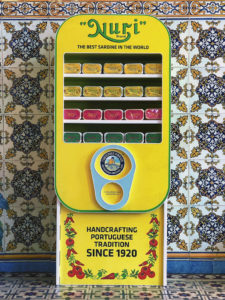
What started as a method to preserve fish in the mid-1800s has turned into art. Conservas de peixe makes the perfect souvenir, not only for what’s inside but for the art of the can itself. Fish tins can be found adorned in traditional and contemporary artwork.

The Conserveira de Lisboa in downtown’s Baixa is a third-generation family-run grocery store founded in 1930. It looks like an old-fashioned apothecary but its shelves are filled with house-brand labels like Trincana, Prato do Mar and Minor.
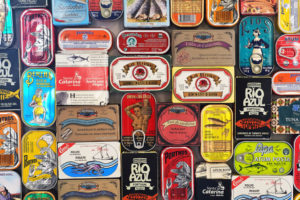 None other than the ANICP – Portuguese National Association of Canned Fish Manufactures – is behind the Loja das Conservas, which opened in 2013. There one can find a wide array of canned fish from more than the dozen canning factories spread throughout the country.
None other than the ANICP – Portuguese National Association of Canned Fish Manufactures – is behind the Loja das Conservas, which opened in 2013. There one can find a wide array of canned fish from more than the dozen canning factories spread throughout the country.
On the advice of Europe’s scientific body ICES ( International Council for the Exploration of the Sea), the capture of sardines has been considerably decreased. ‘If we don’t limit the fishing on our Atlantic coast, we won’t have any more sardines within a couple of years’, explains Ana Paula Vitorino, the Portuguese Minister of Fisheries.
Bom fim de semana Enjoy the weekend (pic Potter/Eater/Público)

